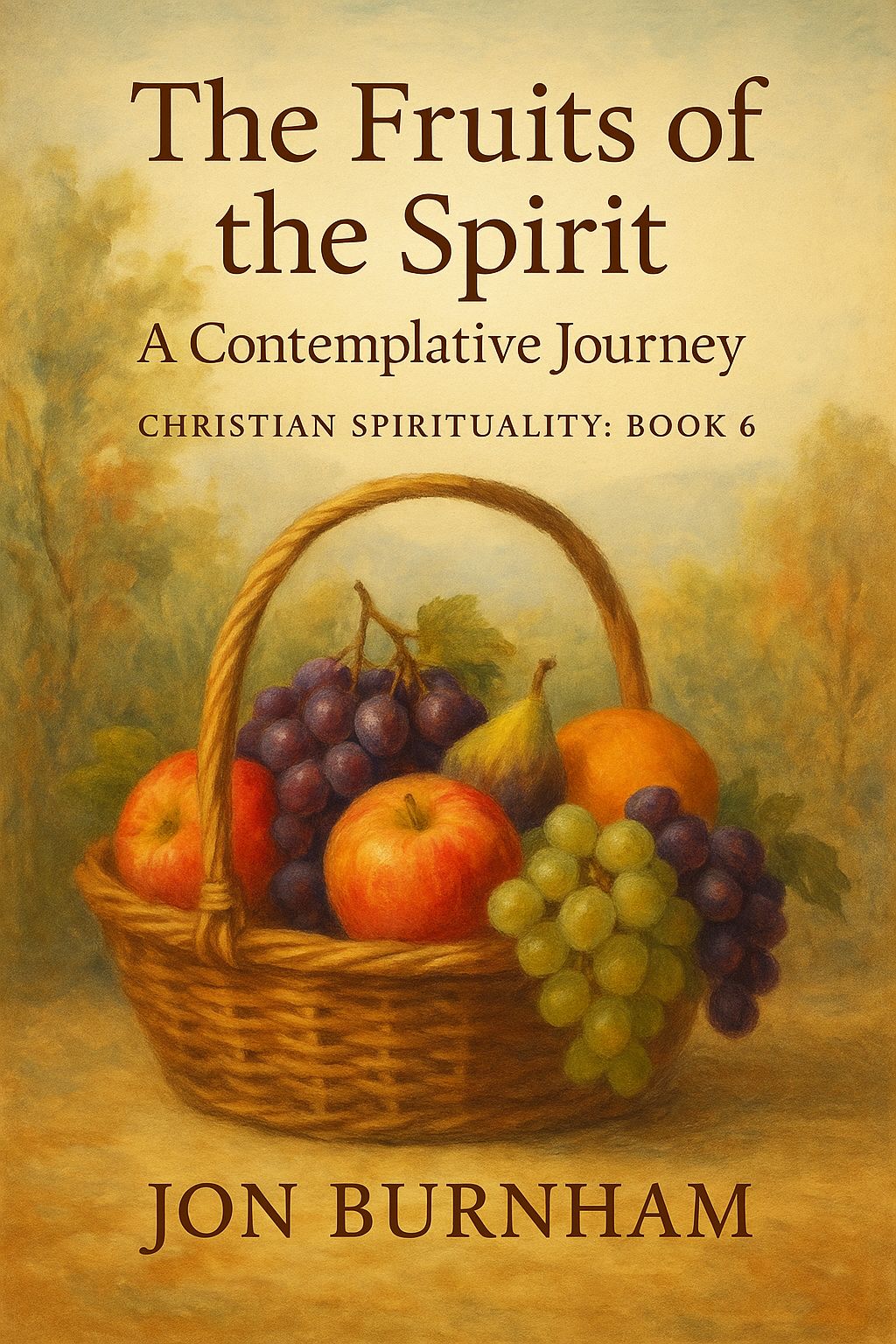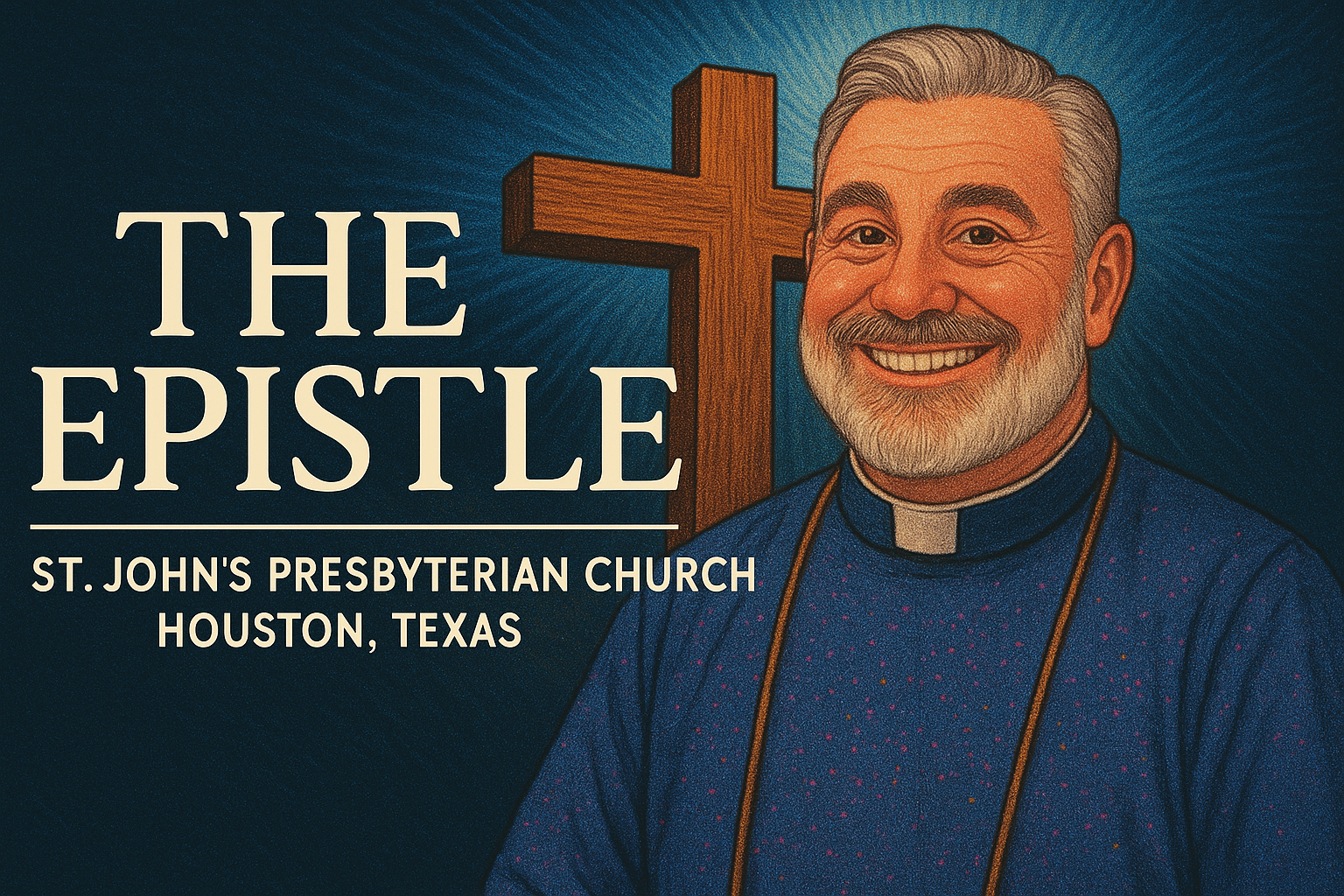Growing Spiritual Fruit: A Contemplative Journey for Houston Christians
I've been a pastor long enough to recognize a particular pattern. Someone approaches me after worship, usually looking slightly embarrassed, and says something like: "Pastor Jon, I've been a Christian for twenty years. I know I'm supposed to have love, joy, peace, all those fruits of the Spirit. But honestly? I'm still impatient with my kids, anxious about money, and struggling to be kind to my difficult neighbor. What am I doing wrong?"
Here's what I usually tell them: You're not doing anything wrong. You're just trying to grow fruit through willpower instead of letting the Gardener do the growing.
That realization led me to write
The Fruits of the Spirit: A Contemplative Journey, the sixth book in my Christian Spirituality series. Not because Houston needs another book telling Christians to try harder, but because we need to understand how spiritual transformation actually happens.
At St. John's Presbyterian Church, we've discovered something powerful about spiritual growth. It doesn't happen through gritting your teeth and forcing yourself to be more patient. It happens through contemplative practices that create space for God's Spirit to do what only God can do: make things grow.
The Problem with Trying Harder
Walk into most Houston churches and you'll hear sermons about the fruits of the Spirit. Love, joy, peace, patience, kindness, goodness, faithfulness, gentleness, self-control. These nine characteristics from Galatians 5:22-23 represent what mature Christian life looks like.
But here's what typically happens. The pastor preaches an inspiring message about patience. You leave worship determined to be more patient. Monday morning, your teenager ignores your instructions for the fourth time, traffic on I-610 makes you late for work, and your coworker undermines you in a meeting. By Tuesday, you've concluded you're a terrible Christian because you snapped at everyone.
The cycle repeats with each fruit. Try harder to be joyful. Try harder to have peace. Try harder to control yourself. And when you inevitably fail, you either give up or redouble your efforts, which leads to burnout or self-righteousness.
After years of pastoral ministry at St. John's Presbyterian Church in Houston, I've watched too many sincere Christians exhaust themselves trying to manufacture fruit through sheer determination. That's not how gardens work.
What Contemplative Christianity Teaches About Spiritual Growth
The book I wrote draws heavily from contemplative Christian tradition. Not the trendy spirituality-without-commitment that's popular in Houston right now, but the deep wells of Christian mysticism that have sustained believers for centuries.
The Desert Fathers and Mothers who fled to Egyptian wilderness in the third and fourth centuries. Teresa of Avila navigating her inner castle. John of the Cross walking the dark night of the soul. Thomas Merton finding God in silence. These contemplatives understood something we've largely forgotten: spiritual transformation happens in stillness and surrender, not through religious striving.
At St. John's Presbyterian Church, we've been rediscovering these contemplative practices. Our Bible study groups explore not just what Scripture says, but how to actually live it through practices like centering prayer, lectio divina, and contemplative silence. We're learning what the mystics knew: you can't force spiritual fruit any more than you can force tomatoes to grow in your garden.
What you can do is create conditions for growth. Till the soil. Water regularly. Remove weeds. Provide sunlight. Then trust the seed to do what seeds do when given proper environment.
How the Book Works
The Fruits of the Spirit: A Contemplative Journey takes each of the nine fruits and explores it through five movements:
- The Seed explores where this particular fruit begins in God's own nature. Love isn't something God commands from a distance. Love is who God is. When love grows in you, it's God's own life taking root.
- The Resistance honestly addresses what opposes this fruit's growth. Not just external obstacles, but the internal resistance we rarely acknowledge. Why does gentleness terrify us? Why does true peace feel threatening? What makes us fight against the very things we claim to want?
- The Work of Grace reveals how God breaks through our resistance. Not through force, but through the patient, relentless, tender work that only grace can accomplish. This is where contemplative practices create space for God to work.
- The Fruit Matured shows what transformation actually looks like. Not perfection, but authentic change. Real love that sustains through difficulty. Actual peace that holds during chaos. Genuine self-control that becomes freedom rather than restriction.
- Living It Forward offers practical contemplative practices you can incorporate into your Houston life. These aren't complicated spiritual techniques requiring hours of free time you don't have. They're simple practices that create regular space for God's transforming presence.
Why Story Matters
One distinctive feature of this book is that each chapter includes a narrative. Not because I wanted to entertain readers, but because story does something that explanation alone cannot.
You'll meet characters like The Surrendered One learning peace, The Gentle Guardian discovering kindness, and The Steadfast Pilgrim walking faithfulness. These aren't allegories where every detail represents something else. They're fully realized stories that embody the spiritual journey each fruit requires.
Why does this matter? Because we don't just need information about patience. We need to see what patience looks like when it's actually lived. We need to recognize our own struggles in characters who face similar challenges. We need imaginative examples that make abstract virtues concrete.
At St. John's Presbyterian Church, we've found that people remember stories long after they forget sermon points. The stories in this book stick with you, surfacing when you face situations that call for particular fruits.
For Houston Christians Who Want Depth
Houston offers countless church options. Megachurches with elaborate productions. Contemporary churches focused on feeling good. Traditional churches maintaining familiar rituals. Each serves different needs and reaches different people.
But what if you're hungry for something deeper? What if you've attended church for years, know all the right answers, but sense there's more to Christian life than what you're experiencing? What if you're exhausted by religious performance but don't want to abandon faith altogether?
That's exactly who this book serves. The spiritually curious who want contemplative depth without drowning in academic theology. The honestly struggling who are tired of pretending they have it all together. The seekers who know that transformation doesn't happen through information alone.
At St. John's Presbyterian, we've built our ministry around this kind of substantive faith. We're not the biggest church in Houston, and we're fine with that. We'd rather offer depth than spectacle. Our Bible studies go beneath surface-level devotionals. Our worship engages both mind and heart. Our mission work puts faith into action in Houston's neighborhoods.
This book extends that same approach to personal spiritual formation. It's like having a spiritual director guide you through the contemplative tradition while keeping both feet planted in real life.
What Makes This Different from Other Books on the Fruits
Walk into any Houston Christian bookstore and you'll find dozens of books about the fruits of the Spirit. What makes this one different?
- It's grounded in contemplative tradition. Most books on spiritual fruit pull from contemporary Christian culture or self-help psychology. This book draws from two thousand years of Christian mysticism, bringing ancient wisdom into conversation with modern life.
- It integrates story and reflection. Rather than just explaining what each fruit means, the book lets you experience the journey through narrative before unpacking the spiritual principles.
- It's psychologically honest. We don't just talk about what fruits we should have. We explore why we resist them, what fears block their growth, and how God works with our actual psychology rather than demanding we become someone we're not.
- It offers genuine practices, not just principles. Each chapter includes contemplative exercises you can actually do. Not busy work to check off a list, but invitations to stillness where transformation happens.
- It assumes you're intelligent and curious. This isn't a dumbed-down devotional. It trusts readers to engage complex ideas while keeping the language accessible. Grandma could read it, but theologians won't find it shallow.
How This Book Connects to St. John's Ministry
When I wrote
The Fruits of the Spirit, I was writing from my experience as pastor of St. John's Presbyterian Church in Houston. The contemplative practices I describe aren't theoretical. They're what our community has been exploring together.
We have had some study groups at our church sometimes incorporate centering prayer before diving into Scripture. Our small groups have at times practiced contemplative listening where we actually hear each other rather than just waiting for our turn to talk. Our worship includes moments of silence that create space for God to speak.
We've discovered that slowing down doesn't make us less effective. It makes us more attentive to how God is actually working in our lives and our neighborhood. The fruits of the Spirit grow better in soil that's been prepared through contemplative practice.
The book also reflects our approach to mission. At St. John's, we don't separate spirituality from service. When you grow in love, you naturally serve at our food pantry. When you develop patience, you're better equipped to work with difficult situations in our single-parent family ministry. When you mature in gentleness, you bring that spirit to our community garden where we serve neighbors.
Spiritual fruit isn't just personal transformation. It's the character needed to sustain long-term mission in Houston's diverse, challenging urban environment.
Who Should Read This Book
I wrote The Fruits of the Spirit: A Contemplative Journey for several overlapping groups:
- Long-time Christians who are spiritually hungry. You've been attending church for years, maybe decades. You know the Bible, serve faithfully, and genuinely love God. But something feels missing. You sense there's depth you haven't accessed, a intimacy with God that eludes you. This book invites you into contemplative practices that can break through spiritual plateau.
- Seekers exploring Christian faith. You're curious about Christianity but turned off by superficial spirituality or rigid fundamentalism. You want something intellectually honest and experientially real. This book presents Christian transformation as it's been practiced by mystics and contemplatives for centuries, offering depth without demanding you check your brain at the door.
- Christians exhausted by religious performance. You're tired of pretending you have it all together. Tired of trying harder to be a better Christian. Tired of guilt when you fail to live up to impossible standards. This book offers grace instead of guilt, surrender instead of striving, God's work instead of your effort.
- Those who've tried meditation or mindfulness. You've experimented with secular mindfulness or even Eastern meditation practices. You've discovered the value of silence, stillness, and present-moment awareness. But you're wondering how these practices connect to Christian faith. This book shows how contemplative Christianity offers deep practices rooted in relationship with the living God revealed in Jesus Christ.
- Presbyterians and Reformed Christians wanting contemplative depth. Sometimes people assume contemplative spirituality is only for Catholics or mystics. This book brings contemplative wisdom into conversation with Reformed theology, showing how Presbyterian Christians can embrace contemplative practices while remaining faithful to our theological tradition.
- Houston residents dealing with urban stress. Houston's pace, traffic, diversity, and challenges create particular pressures. This book addresses how to grow spiritual fruit in the concrete circumstances of life in a major metropolitan area. The practices are realistic for people with jobs, families, and responsibilities, not just for monks in monasteries.
Contemplative Practices for Real Life
One concern I often hear: "Pastor Jon, I don't have time for lengthy contemplative practices. I work full-time, have kids, deal with Houston traffic. How am I supposed to sit in silence for hours?"
The contemplative practices in this book are designed for real people with real lives. Not monastic ideals that require withdrawing from the world, but practices you can integrate into your actual Houston existence.
- Brief centering prayer. Even five minutes of silence can create space for God. You don't need a hour-long meditation retreat. You need regular, brief moments of stopping and opening yourself to God's presence.
- Contemplative Scripture reading. Instead of racing through chapters to check off your Bible reading plan, spend time with a single verse. Read it slowly multiple times. Let it speak to your heart, not just your head.
- Practicing presence. Bring contemplative awareness to ordinary activities. Washing dishes can become prayer. Driving can become meditation on God's presence. Walking your dog can become communion with the Creator.
- Examen at day's end. Spend five minutes before bed reviewing your day with God. Where did you notice God's presence? Where did you resist the Spirit's invitation? This simple practice develops spiritual attentiveness over time.
- Breath prayer. Choose a short phrase (like "Jesus, have mercy" or "God, I trust you") and pray it in rhythm with your breathing. This ancient practice calms anxiety while keeping you connected to God throughout your day.
- Holy leisure. In a culture of constant productivity, simply being present without agenda becomes a spiritual practice. Sit on your porch without your phone. Watch the sunset. Let yourself just be rather than constantly doing.
These practices don't require special equipment, retreats to monasteries, or hours of free time. They require only willingness to create small, regular spaces where God can work.
The Theological Foundation
Let me be clear about the theological framework underlying this book, because it matters for those exploring what St. John's Presbyterian Church believes and teaches.
- We're thoroughly Reformed and Presbyterian. This book doesn't abandon Presbyterian theology for mystical vagueness. It brings contemplative practices into conversation with Reformed understanding of grace, sovereignty, and transformation through the Holy Spirit.
- We take Scripture seriously. Every fruit explored in the book is rooted in biblical teaching. We're not inventing new spirituality or importing practices that contradict Scripture. We're rediscovering how Christians have historically understood and practiced biblical truth.
- We emphasize God's initiative. This is crucial. Contemplative practices don't make God show up. They help us notice God's presence that's already there. The book consistently emphasizes that transformation is God's work, not ours. We create space; God does the growing.
- We're Trinitarian. The Father plants the seed, the Son reveals what maturity looks like, the Spirit does the actual transforming work. This isn't generic spirituality. It's specifically Christian contemplation rooted in relationship with the triune God.
- We connect inner life and outer service. Contemplation never becomes escape from the world. It equips us for more faithful engagement with Houston's needs. The fruits of the Spirit prepare us for mission, not just private piety.
- If you're Presbyterian or from another Reformed tradition, this book will feel theologically at home. If you're from a different background, you'll encounter Reformed theology presented through the lens of contemplative practice in ways that may surprise you.
Beyond Individual Transformation
One limitation of most books on spiritual fruit: they focus exclusively on individual transformation. How do you become more patient? How does your life demonstrate peace?
While personal transformation matters, this book also explores how spiritual fruit shapes community. At St. John's Presbyterian Church in Houston, we've discovered that contemplative practices don't just change individuals. They transform how we relate to each other.
A church where people practice patience becomes a church that works through conflict without splitting. A church that cultivates gentleness becomes a place where the vulnerable feel safe. A church that grows in faithfulness sustains long-term mission commitments instead of chasing whatever program is currently trendy.
The book includes
reflection on how each fruit builds community. Love doesn't just change your heart; it changes how the church loves its neighborhood. Joy doesn't just lift your spirits; it creates a congregation that celebrates rather than criticizes. Self-control doesn't just help you resist temptation; it builds a church that exercises discipline with grace rather than judgment.
For those involved in church leadership at St. John's or elsewhere in Houston, this book offers wisdom for
cultivating congregational culture where spiritual fruit can grow.
Getting Started with the Book
The Fruits of the Spirit: A Contemplative Journey
is available in both paperback and Kindle editions on Amazon. Search for "Jon Burnham Fruits of the Spirit" and you'll find it easily.
The book is designed to be read slowly. Don't rush through it. Spend a week or more with each chapter, giving yourself time to engage the story, reflect on the movements, and practice the contemplative exercises.
You could read it alone as personal spiritual formation. Many people journal as they work through each fruit, noting how the chapter speaks to their current struggles and growth edges.
You could also read it with a small group. At St. John's Presbyterian Church, several of our Bible study groups have worked through the book together, discussing the stories and practicing the contemplative exercises as a community. That shared experience deepens both the learning and the relationships.
If you're part of our St. John's community, you're welcome to contact me to discuss the book, ask questions about contemplative practices, or talk about how to integrate these approaches into your spiritual life. I'm always glad to meet with people who are genuinely seeking deeper relationship with God.
For those not part of St. John's, the book stands on its own as a guide to contemplative Christian spirituality. But if you find it speaks to you, I'd invite you to visit us on Sunday morning at 11:00 AM. You might discover a community that's exploring the same contemplative depths that drew you to the book.
Where This Fits in the Christian Spirituality Series
The Fruits of the Spirit is the sixth book in my Christian Spirituality series. Each book explores a different dimension of what it means to live in Christ.
If you've read the earlier books in the series, this one will feel like a natural progression. If this is your first exposure to my writing, it works perfectly as a standalone volume. You don't need to read the others first, though you might find them valuable companions.
The series as a whole reflects what we practice at St. John's Presbyterian Church in Houston: faith that engages both mind and heart, tradition that speaks to contemporary life, spirituality that's rooted in Scripture and Christian history rather than contemporary self-help trends.
All six books in the Christian Spirituality series are available on Amazon. You can find them by searching my name, Jon Burnham, along with the series title.
An Invitation to the Garden
The image that runs through this book is simple: God is the Gardener, and your life is a garden where God is growing fruit.
You can't force fruit to grow. But you can create conditions where growth becomes possible. You can clear away weeds. You can provide water. You can ensure adequate sunlight. Then you trust the seed to do what seeds do.
Contemplative Christianity offers practices that till the soil of your soul. Silence that clears away noise so you can hear God's voice. Solitude that creates space for God's presence. Scripture reading that plants God's word deeply. Prayer that opens you to God's work.
At St. John's Presbyterian Church in Houston, we're learning together what it means to be God's garden. Not perfectly. Not without struggle or setback. But with increasing trust that the Gardener knows what God is doing.
This book invites you into that same journey. Not because Houston needs more religious information, but because we all need transformation we can't accomplish on our own.
The fruits of the Spirit aren't achievements to cross off your spiritual to-do list. They're life that grows when you make space for the Gardener to work.
Welcome to the garden. The Gardener has been expecting you.
Pastor Jon Burnham serves St. John's Presbyterian Church in Houston, Texas, where the congregation explores contemplative Christian practices alongside missions and community engagement. For more information about St. John's ministry, visit us at 5020 West Bellfort Avenue or call 713-723-6262. Sunday worship begins at 11:00 AM, and all are welcome.





